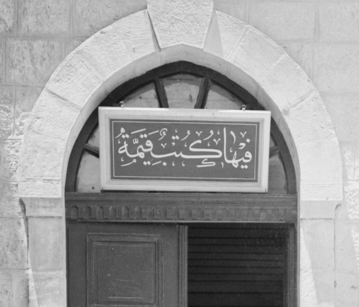A short Urdu biography of Khwaja Khan Muhammad رحمه الله تعالى by Mawlana Shaykh Rasheed al-Haq Khan Abid. khawaja-khan-muhammadDownload
Author Archives: Faraz Abdul Moid
Book Review: Dār al-Mīzān’s Publication of Taʾwīlāt al-Qurʾān
Dār al-Mīzān’s Publication of Taʾwīlāt al-Qurʾān (Tafsīr al-Māturīdī) in 19 volumesReviewed by Mawlana Kamil UddinChair, Department of Qur’anic Exegesis at Darul Qasim CollegeLibrarian, Mawlana Anwar Shah Kashmiri Library at Darul Qasim College dar_al_mizans_publication_of_tawilat_alDownload
Research on the Dominant Views Where Imam Ṭaḥāwī Disagrees with Imam Abū Ḥanīfa in Sharḥ Maʿānī al-Āthār
Research on the dominant views where Imam Ṭaḥāwī disagrees with Imam Abū Ḥanīfa in Sharḥ Maʿānī al-Āthār.
Readings Amidst the Pandemic
بسم الله الرحمن الرحيم يا سَلَام، صَلِّ وَ سَلِّم عَلَى النَّبِيِّ الأَمَان يا مُهَيْمِن، صَلِّ وَ سَلِّمْ عَلَى النَّبِيِّ المُيَسِّر يا حَفِيظ، صَلِّ وَ سَلِّم عَلَى النَّبِيِّ العَزِيز Below are works written regarding plagues/pandemics and general distresses. The last two Arabic works concern the virtues of solitude, which can be benefited from in light ofContinueContinue reading “Readings Amidst the Pandemic”
Resources for Introduction to Hadith Sciences
بسم الله و الحمد لله مقدمة في أصول الحديث al-Muhaddith Abd al-Haqq al-Dehlawi (كشف المغيث (شرح مقدمة في أصول الحديث للدهلوي Mufti Shu’aybullah Khan al-Miftāhi شرح المنظومة البيقونية Shaykh Abdullah Sirājuddin نزهة النظر شرح نخبة الفكر Imam Ibn Hajr al-‘Asqalāni (tahqīq of Shaykh Nūruddīn ‘Itr) القول المبتكر على شرح نخبة الفكر Allāmah Qāsim ibnContinueContinue reading “Resources for Introduction to Hadith Sciences”
How to Perform Hajj, Umrah, & Ziyarah – by Shaykh Saleem Dhorat
asSalaamu Alaikum, How to Perform Hajj How to Perform Umrah How to Perform Ziyarah With Hajj less than a month away, these concise booklets compiled by Shaykh Saleem Dhorat (db), published by Islamic Dawah Academy, will be of great benefit to those preparing for the blessed journey and anyone else who plans on visiting forContinueContinue reading “How to Perform Hajj, Umrah, & Ziyarah – by Shaykh Saleem Dhorat”

